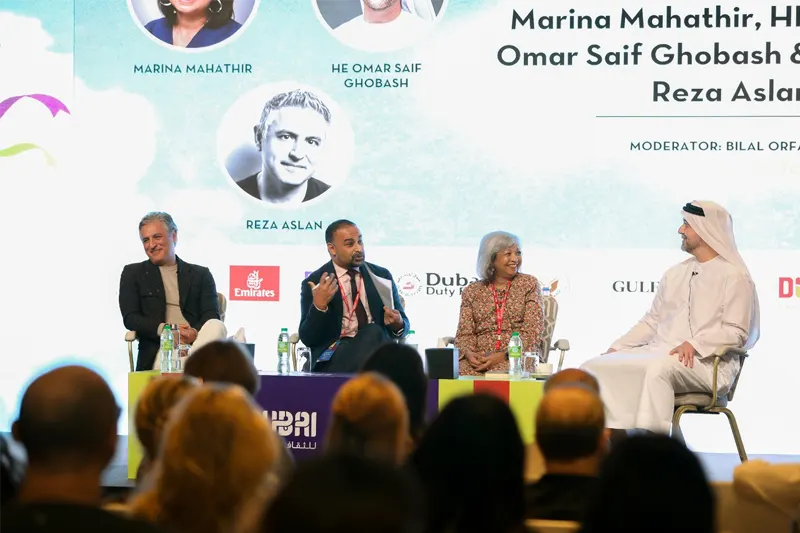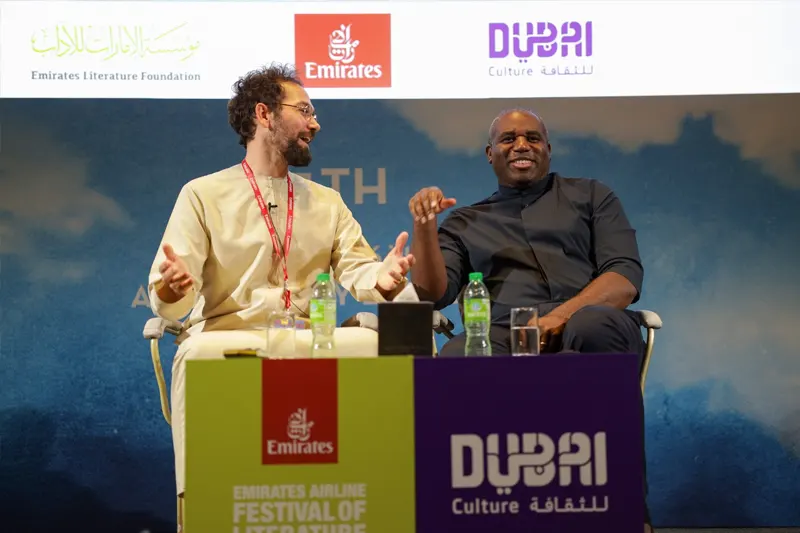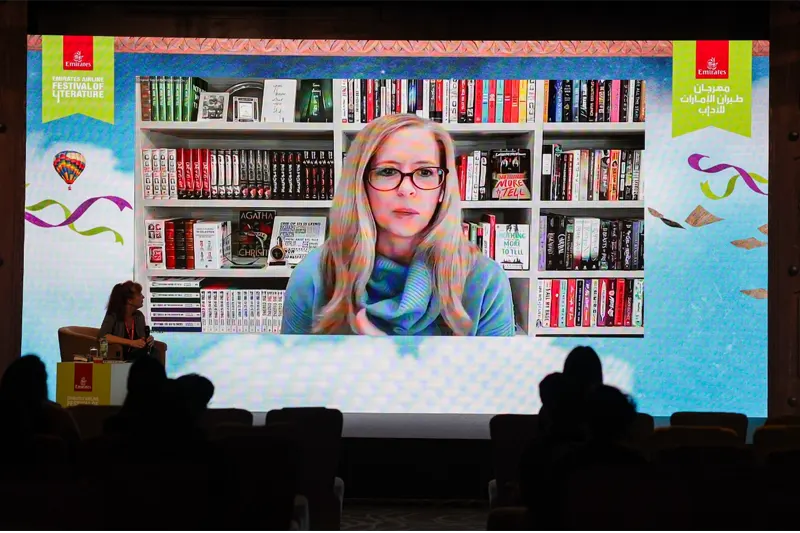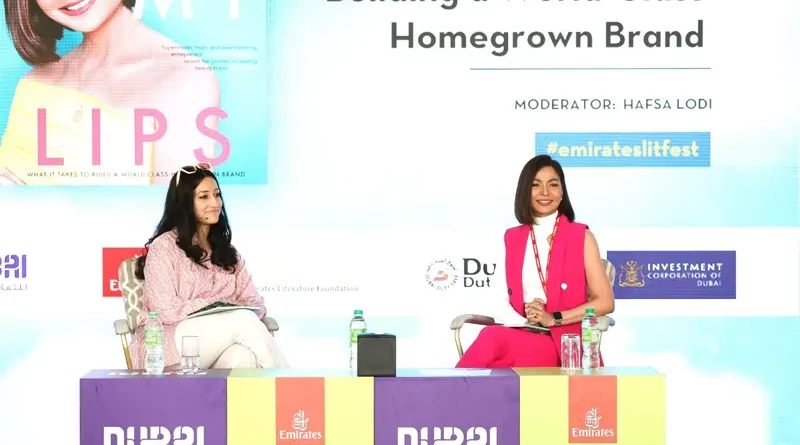The third night of the Emirates LitFest saw an impressive line-up of speakers
Member of Parliament for Tottenham since 2000, David Lammy discussed humans’ desire to belong to a wider group world over, and how aspects of life such as migration and growing up with mixed heritage can impact our lives and cause a search for belonging. He also talked about dealing with death threats and hate as a Black man in Parliament.
“The journey I’ve made is part of the reason I write,” said Lammy. “It’s a way of making sense of the world I’m in.”
He added, “It is a human condition to want to know where you’re from. If you know where you are from, it locates you in this big world.”
—
Socio-political activist and daughter of former Malaysian Prime Minister Dr. Mahathir, Marina Mahathir, discussed her latest memoir, The Apple and the Tree, and how she went on to find her own path despite growing up with a famous father, going on to become a journalist and campaigner who works towards eradicating corruption and human-trafficking and fighting for the rights of those who are discriminated against.

“The title came from my youngest daughter, because every time I scolded her for something, she would stare at me and go, ‘apple-tree.’ Meaning that everything I complained about had to come from me. So everything was my fault. I thought that was a good title,” explained Mahathir. “But I also wanted to say that the apple didn’t have to be an exact clone of the original tree and could fall a bit further and come out of the shadows and be something a little different.”
“I would credit my time in HIV because I got to meet so many different types of people with different ideas and different lifestyles. It is possible for you to be many things.” said Marathir about how she navigates her views being considered too ‘liberal’ by those she feels embraces the binary of others being ‘with’ or ‘against’ them. “The word now is ‘transectionality’ where you can be different things to different people at the same time without necessarily meaning you are good or bad.”
—
Karen McManus, the best-selling author behind young adult thrillers Nothing More to Tell and One of Us is Lying (now adapted into a Netflix series), talked about her writing journey thusfar, avoiding TikTok, dealing with becoming famous, and returning to the world of Bayview High, with her third and possibly final book in the series, One of Us is Back, which will be released in July 2023.


“My first book was a very personal book, I definitely did put elements of myself and things I had struggled with into each character,” said McManus. “I was a people pleaser like Cooper, I had a controlling boyfriend like Addy, I was an ambitious student who couldn’t quite reach the heights I wanted like Bronwyn and there were people I loved who were dealing with addiction like Nate. So all of that worked it’s way in and things a lot of readers can identify with also.”
“You can fix a bad draft, but you can’t fix a blank page,” said McManus about her writing process. “I wrote two books that were absolutely terrible before One of Us is Lying. After a lot of rejections, what kept me going is the joy of creating, because I’d always wanted to write but I didn’t think I could make a career out of it. I didn’t create for so many years. The feeling of writing again was exciting and connecting to other authors and trading ideas also helped.”
Key Highlights – Day four (4th Feb 2023)
Saturday, 4 February focused on overcoming hurdles as you work towards a goal, as various speakers from diverse fields all talked about the challenges they’d gone up against — both in the work place and in their lives.
—
Co-founder of Happy Skin Cosmetics, Rissa Mananquil Trillo shared the experiences that paved the way to starting her own beauty brand. Being a former beauty columnist and model she recognised a gap in the market for cosmetics that would care for skin. She also shared the raw truth behind being an entrepreneur.
“Being a business owner is a dream but I wanted to share the hard truths about entrepreneurship,” said Trillo. “I wanted the readers to feel that through whatever they read in the book, that they could also write their own stories.”
“Profit is not just the only driving force behind starting a business, but also the purpose.” added Trillo
—
Business coach Ann Hiatt reflected on her extensive career in Silicon Valley, having worked herself up from being a personal assistant at Amazon to eventually partnering with Jeff Bezos, the founder of the company, before going on to do the same at Google and Yahoo.
“Approach your career like an owner and not an employee,” said Hiatt, encouraging people to have agency in their careers, regardless of their positions.
—
Former Editor-in-Chief of British Vogue, Alexandra Shulman, took us through her 25-year journey at the magazine back to when they still used typewriters, as well as the challenges she faced being stereotyped as a ‘words’ person rather than a ‘visual’ or ‘fashion’ person.
“The core of the job,” Shulman shared about her work at British Vogue magazine, “was to try and view the world through the filter of Vogue which was a magazine about fashion, beauty and celebrity.”
Shulman also discussed the difference between fashion and clothes: “Fashion is a hybrid of art and commerce whereas clothes is part of our culture and everyone here has made a decision to wear what they’re wearing.”
—
Bilal Orfali moderated a panel on the Past, Present and Future of Islam with former Malaysian PM Dr Mahathir’s daughter Marina Mahathir, Emirati diplomat HE Omar Saif Ghobash and religious commentator Reza Aslan. Mahathir shared her opinion on who a Muslim leader is: “I think the problem is that a lot of Muslim leaders have been men. And sometimes I think their default setting is to be in conflict.” She continued that there are wonderful people in the NGO industry and a lot of small people who are not given their due and that those are the type of leaders we need not just in the Muslim world but all over.
Reza discussed the similarities between culture and religion: “You have to think of religion as water, and culture as the vessel that holds the water. Islam is water and you can fill that water into any vessel, and it will take the shape that that vessel is.”
“It is not a choice, it is an epiphany,” Ghobash said when asked what his idea of faith was, “a moment when you realise that your mind can take you to the limits of reason and then there is nothing left. And you’re left with material – or you’re left with the hope that there’s something great, the transcendence.”

